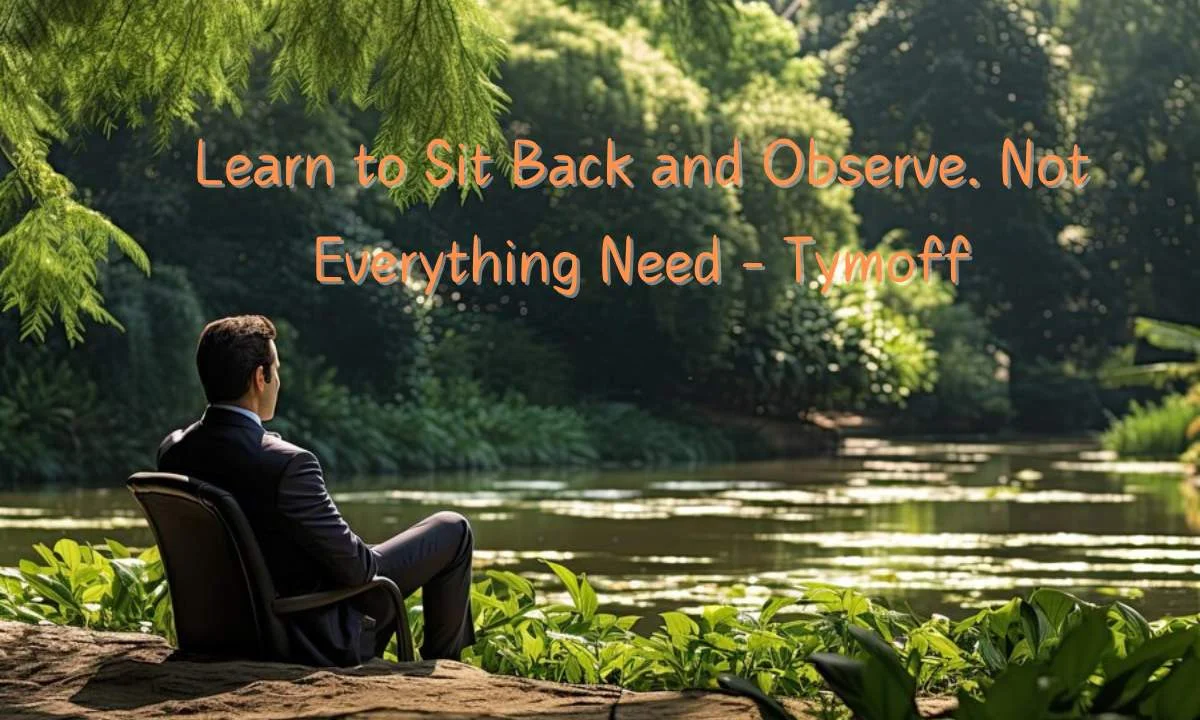Learn to Sit Back and Observe. Not Everything Need – Tymoff

Learn to Sit Back and Observe. Not Everything Need – Tymoff: In the hustle and bustle of life, it’s essential to learn to sit back and observe. Not everything needs your immediate attention. Discover the art of mindful observation with our comprehensive guide.
Introduction
In a fast-paced world filled with constant stimuli, the ability to sit back and observe can seem like a lost art. However, learning to embrace moments of stillness and mindfulness can provide numerous benefits for both mental and emotional well-being. In this article, we’ll delve into the importance of observing without always reacting, exploring various strategies to incorporate this practice into your daily life.
The Benefits of Observing Without Reacting
Understanding the Power of Presence
Taking a moment to pause and observe allows us to fully engage with the present moment. By cultivating a sense of presence, we can experience greater clarity and focus in our daily activities.Learn to Sit Back and Observe. Not Everything Need – Tymoff
Embracing Mindful Observation Techniques
Practicing Mindful Breathing
One effective way to cultivate the art of observation is through mindful breathing exercises. By focusing on the sensation of each breath, we can anchor ourselves in the present moment and observe our thoughts without judgment.Learn to Sit Back and Observe. Not Everything Need – Tymoff
The Role of Patience in Observation
Cultivating Patience Through Meditation
Meditation serves as a powerful tool for developing patience and honing our observational skills. Through regular practice, we can learn to observe our thoughts and emotions without getting swept away by them.
Overcoming Challenges in the Practice of Observation
Dealing with Distractions
In today’s hyper-connected world, distractions abound, making it challenging to cultivate a practice of observation. However, by setting boundaries and prioritizing moments of stillness, we can gradually train our minds to focus on what truly matters.
Implementing Observation in Daily Life
Finding Moments of Stillness
Incorporating observation into our daily routines doesn’t necessarily require lengthy meditation sessions. Simple practices such as taking short breaks to gaze out the window or savoring a cup of tea can provide opportunities for mindful observation.
Frequently Asked Questions (FAQs)
- How can I find time to observe amidst a busy schedule? Observing doesn’t always require large chunks of time. Even brief moments of mindfulness throughout the day can make a significant difference in your overall well-being.
- Is observation the same as being passive? While observation involves stepping back and observing without immediate action, it’s far from being passive. In fact, it requires a high level of attentiveness and engagement with the present moment.
- Can observation help improve my relationships? Absolutely. By cultivating the ability to observe without reacting impulsively, you can enhance communication, empathy, and understanding in your relationships.
- What if I find it difficult to quiet my mind during observation? It’s normal for the mind to wander, especially when first starting out. Instead of getting frustrated, simply acknowledge any thoughts that arise and gently guide your focus back to the present moment.
- How long does it take to see the benefits of observation practice? The benefits of observation can vary from person to person, but many people notice positive changes in their mood and overall well-being within a few weeks of consistent practice.
- Can observation help reduce stress and anxiety? Absolutely. By learning to observe our thoughts and emotions without getting swept away by them, we can develop greater resilience in the face of stress and anxiety.
Conclusion
In a world that often prioritizes action over introspection, the practice of observation offers a valuable counterbalance. By learning to sit back and observe without always feeling the need to react, we can cultivate greater mindfulness, presence, and resilience in our daily lives.



Leave a Comment